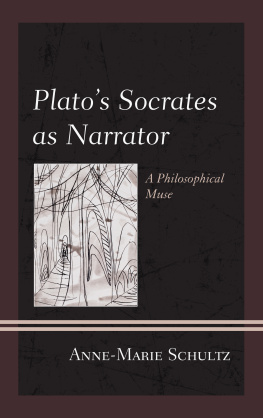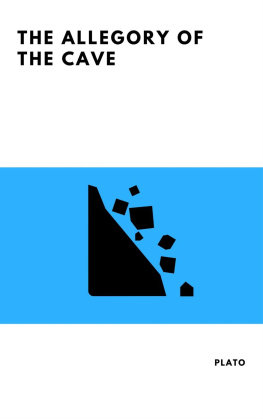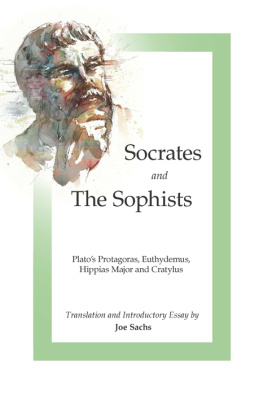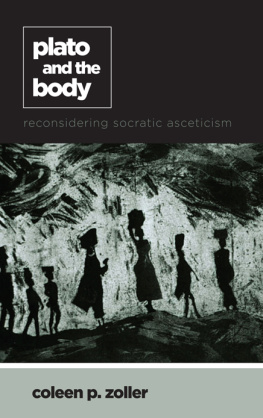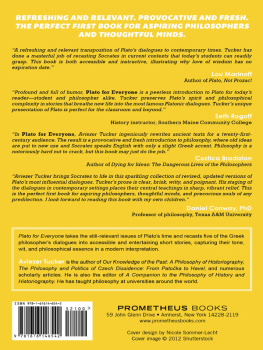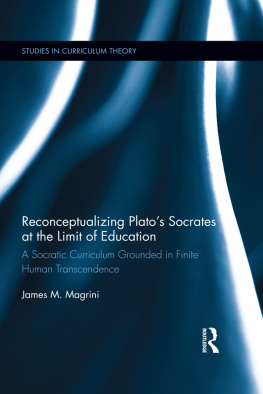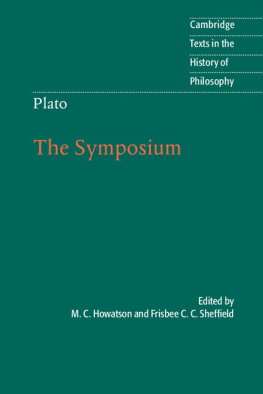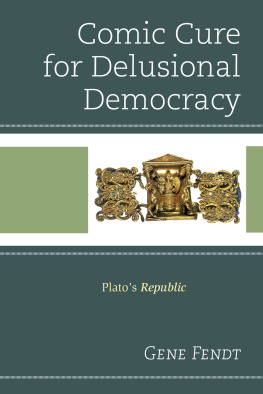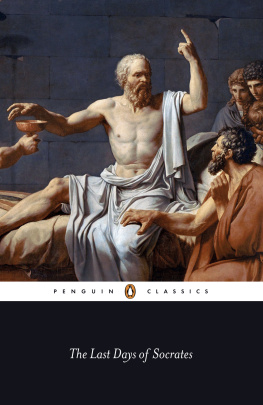Plato. - Platos Socrates as narrator: a philosophical muse
Here you can read online Plato. - Platos Socrates as narrator: a philosophical muse full text of the book (entire story) in english for free. Download pdf and epub, get meaning, cover and reviews about this ebook. City: Lanham, year: 2015;2012, publisher: Lexington Books, genre: Detective and thriller. Description of the work, (preface) as well as reviews are available. Best literature library LitArk.com created for fans of good reading and offers a wide selection of genres:
Romance novel
Science fiction
Adventure
Detective
Science
History
Home and family
Prose
Art
Politics
Computer
Non-fiction
Religion
Business
Children
Humor
Choose a favorite category and find really read worthwhile books. Enjoy immersion in the world of imagination, feel the emotions of the characters or learn something new for yourself, make an fascinating discovery.
- Book:Platos Socrates as narrator: a philosophical muse
- Author:
- Publisher:Lexington Books
- Genre:
- Year:2015;2012
- City:Lanham
- Rating:5 / 5
- Favourites:Add to favourites
- Your mark:
- 100
- 1
- 2
- 3
- 4
- 5
Platos Socrates as narrator: a philosophical muse: summary, description and annotation
We offer to read an annotation, description, summary or preface (depends on what the author of the book "Platos Socrates as narrator: a philosophical muse" wrote himself). If you haven't found the necessary information about the book — write in the comments, we will try to find it.
Platos Socrates as narrator: a philosophical muse — read online for free the complete book (whole text) full work
Below is the text of the book, divided by pages. System saving the place of the last page read, allows you to conveniently read the book "Platos Socrates as narrator: a philosophical muse" online for free, without having to search again every time where you left off. Put a bookmark, and you can go to the page where you finished reading at any time.
Font size:
Interval:
Bookmark:
Platos Socrates as Narrator
Platos Socrates as Narrator
A Philosophical Muse
Anne-Marie Schultz
LEXINGTON BOOKS
Lanham Boulder New York Toronto Plymouth, UK
Published by Lexington Books
A wholly owned subsidiary of The Rowman & Littlefield Publishing Group, Inc.
4501 Forbes Boulevard, Suite 200, Lanham, Maryland 20706
www.rowman.com
10 Thornbury Road, Plymouth PL6 7PP, United Kingdom
Copyright 2013 by Lexington Books
All rights reserved. No part of this book may be reproduced in any form or by any electronic or mechanical means, including information storage and retrieval systems, without written permission from the publisher, except by a reviewer who may quote passages in a review.
British Library Cataloguing in Publication Information Available
Library of Congress Cataloging-in-Publication Data Available
ISBN 978-0-7391-8330-4 (cloth : alk. paper)
ISBN 978-0-7391-8331-1 (electronic)
 TM The paper used in this publication meets the minimum requirements of American National Standard for Information Sciences Permanence of Paper for Printed Library Materials, ANSI/NISO Z39.48-1992.
TM The paper used in this publication meets the minimum requirements of American National Standard for Information Sciences Permanence of Paper for Printed Library Materials, ANSI/NISO Z39.48-1992.
Printed in the United States of America
This book has been a long time coming. The twists and turns of life do not always map neatly onto the expected linearity of an academic career. That is a story in its own right, but I will not tell it here. I had the idea that turned into this book slightly over a decade ago. However, the seed of that idea was planted nearly two decades earlier still. My first acknowledgment of gratitude goes to Chuck Salman. He first taught me to love Plato, the philosophical dramatist. Three others at Trinity University (Larry Kimmel, Willis Salomon, and Victoria Aarons) nurtured my philosophical and rhetorical interests and encouraged me to pursue graduate study.
During my graduate years at Penn State, Stanley Rosen and the late David Lachterman cultivated those seeds and deepened my appreciation of Plato in more ways than I can adequately describe. This book and the one to follow bear the marks of their initial guidance through Platos world. Carl Vaught, who later became my colleague at Baylor for seven years prior to his death, also influenced my thinking in profound ways. I am deeply grateful for the education I received in the Happy Valley and am proud to be a graduate of the Penn State Philosophy Department.
I would also like to thank The College of Arts and Sciences at Baylor University for funding sabbaticals at various stages of this project. I am blessed to have wonderful colleagues in the Philosophy Department and the Honors College who support all the dimensions of my academic work. I am particularly grateful for the mentorship of Bob Baird, Tom Hanks, and Stuart Rosenbaum and the friendship of Lenore and Henry Wright over the years. Special thanks also to the writing groupies: Heidi Bostic, Steven Pluachek, Amy Antoninka, Lenore Wright, Paul Carron, and Lisa Shaver. Without them, you would not be reading this book today. Thanks also to the many research assistants who helped at various stages along the way: Jessy Jordan, Lewis Pearson, Paul Carron, and Taryn Whittington. Thanks also to Leslie Ballard for proofreading the final manuscript. Mary Nichols and Rob Miner also deserve thanks for commenting on chapters of this project. Special thanks as well to my chair, Michael Beaty, and the Dean of the Honors College, Tom Hibbs.
The members of the Ancient Philosophy Society, Society of Ancient Greek Philosophy, and Southwestern Philosophical Society have been receptive audiences for many early iterations of these pages. Marina McCoy, Jill Gordon, and Sara Brill have been particularly supportive both personally and professionally for many years. Im happy to report that you can finally read the whole book!
My parents, Andrea and Michael Frosolono, and sister, Christina Frosolono Sell, have loved me from the very beginning of things. Thanks to Mom for teaching me to read and Dad for teaching me to write. We are, indeed, a family of readers and writers. My brother-in-law, Kelly Sell, provided an inspirational model of staying committed to a goal in the last stages of this endeavor. Finally, to my husband, Jeff Schultz. I dedicate this book to you. Thank you for kindness, patience, love, and love of philosophy, yoga, and travel. I look forward to many happy years together. My golden retriever, Milo, deserves thanks as well just for being the great dog that he is.
Earlier formulations of several chapters have been published previously. An overview of this project first appeared as Know Thyself: Socrates as Storyteller, in PhilosophyinDialogueForm:PlatosManyDevices, ed. Gary Scott (Evanston: Northwestern University Press 2007), 82-109. Thank you to Northwestern University Press for permission to republish here. A small part of the Charmides chapter appeared as Socrates and Sophrosune: Narrative and Ethics in Platos Charmides, Listening:AJournalofPhilosophyandReligion, (2007): 13-23. The Protagoras chapter is an expanded and refined version of Socratic Reason and Emotion: Revisiting the Intellectualist Socrates in Platos Protagoras, in Socrates:ReasonorUnreasonastheFoundationofEuropeanIdentity, ed. Ann Ward (Cambridge: Cambridge Scholars Press, 2007): 1-29. My thanks to Cambridge Scholars Publishing for their permission to republish these works here. A small section of the Euthydemus chapter came out as The Narrative Frame of Platos Euthydemus, SouthwestPhilosophyReview 24 (2009): 163-172. Some of the reflections about narrative irony appear in Revisiting the Ironic Socrates: Eironeia in Socrates Narrative Commentary, SouthwestPhilosophyReview 29 (2012): 23-32.
A Philosophical Muse
As Platos Theaetetus begins, Euclides tells Terpsion about a conversation between Socrates and Theaetetus. Terpsion is eager to hear Euclides account of the conversation. Euclides is happy to comply. Indeed, he has written down a version of the story for just such an occasion.
This is the book, Terpsion. You see, I have written it out like this: I have not made Socrates relate the conversation as he related it to me, but I represent him as speaking directly to the persons with whom he said he had this conversation. (These were, he told me, Theodorus the geometer and Theaetetus.) I wanted, in the written version, to avoid the bother of having the bits of narrative in between the speechesI mean, when Socrates, whenever he mentions his own part in the discussion, says, And I maintained, or I said, or, of the person answering, He agreed or He would not admit this. That is why I have made him talk directly to them and have left out these formulae. (143c)
Terpsion applauds Euclides rhetorical decision: Well, thats quite in order, Euclides. Euclides turns to his slave and commands him to read the book to them (143c). Given their casual disregard for the value of these narrative comments, it is odd that Plato wrote many of his dramatic dialogues in this very manner. In these five dialogues, Socrates recounts his philosophical efforts to help lead his auditors toward the philosophical life.
In this way, Socrates acts as a philosophical muse. Like the muses who inspire artistic creation, Socrates is a muse who inspires philosophical thinking. They are born out of the sustained erotic interactions of Zeus, the symbol of justice, and Memory, the seat of recollection. Socrates narratives are also erotic offsprings of memory in which he recounts his sustained inquiries into friendship, temperance, virtue, education, and justice.
Next pageFont size:
Interval:
Bookmark:
Similar books «Platos Socrates as narrator: a philosophical muse»
Look at similar books to Platos Socrates as narrator: a philosophical muse. We have selected literature similar in name and meaning in the hope of providing readers with more options to find new, interesting, not yet read works.
Discussion, reviews of the book Platos Socrates as narrator: a philosophical muse and just readers' own opinions. Leave your comments, write what you think about the work, its meaning or the main characters. Specify what exactly you liked and what you didn't like, and why you think so.

